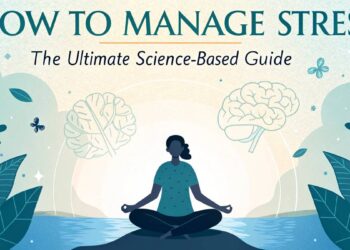Ever notice how your heart races before a big presentation, or your stomach ties itself in knots during a tough conversation? That’s not just nerves – it’s your body’s ancient alarm system hard at work. While our ancestors used this response to outrun predators, we’re now using it to survive deadline pressures and social media anxiety.
Understanding how stress impacts your body isn’t just fascinating science – it’s your secret weapon for turning your body’s emergency response system from your enemy into your ally. Whether you’re dealing with everyday tension or chronic pressure, knowing how stress affects you physically can be the first step toward taking control of your well-being.
Stress and its Impact
Stress pops up in everyday life. Understanding how it makes your body feel and spotting its physical signs helps keep your cool when things heat up.

Understanding Stress
Stress is what happens when your body senses danger or pressure. You know that tingly feeling when you’re about to speak in front of a crowd or see a spider? That’s your body’s “fight-or-flight” kicking in, with hormones like cortisol and adrenaline flooding your system.
“The greatest weapon against stress is our ability to choose one thought over another.” – William James
They’re like your body’s personal fire alarm. But if it keeps going off, it can start messing with your health. Want the scoop on the cortisol stress hormone? Check it out.
| Stage of Stress Response | What Happens Here |
|---|---|
| Alarm | Red alert! Hormones rush in to gear you up. |
| Resistance | Still on edge, trying to chill out. |
| Exhaustion | Your energy’s spent; trouble’s on the horizon if you don’t recover. |
The Connection Between Stress and Physical Symptoms
Stress that sticks around messes with how your body feels. Knowing the signs can set you up to tackle stress head-on. Symptoms hit all over – from tight muscles and headaches to tummy troubles and skin flare-ups. Spotting these early means you can jump into action with stuff like quick stress relief techniques.
Here’s a rundown of stress’s physical signs:
| Physical Symptom | What It Feels Like |
|---|---|
| Muscle Tension | Like a knot in your back or neck. |
| Headaches | Those annoying, nagging head pains. |
| Digestive Issues | Trouble in tummy town, like an upset stomach. |
| Fatigue | Drained and wiped out, all the time. |
| Insomnia | Tossing and turning, unable to snooze. |
| Chest Pain | Hurts in the heart area but not the lovey-dovey kind. |
| Rapid Heartbeat | Thumper’s on the run without you moving a step. |
Spotting these tells you it’s time to put a stress management plan in place, maybe even throw in some breathing exercises to get back to feeling good.
For more ways to handle specific stress symptoms, check out our reads on chronic stress symptoms, nature therapy stress relief, and best exercises for stress.

Physical Symptoms of Stress
Stress likes to sneak up on folks and throw curveballs at their physical health. Spotting these signs is the first move in the right direction toward chilling out a bit.
“Your body is your most priceless possession… take care of it.” – Jack Lalanne
Muscle Tension and Pain
Muscle tension and pain often crash the party when stress is around. When stress is high, muscles get tight, especially in spots like your neck, shoulders, and back, which can end up a real pain if ignored.
| Symptom | Common Hangout Spots |
|---|---|
| Muscle Tightness | Neck, Shoulders, Back |
| Muscle Ache | Neck, Shoulders, Back |
Getting hip to how stress and muscle tension are buddies is key. Our article on quick stress relief tricks has neat tips to help unclench those muscles.
Headaches and Migraines
Headaches love stress as a sidekick. Stress can spark tension headaches and, if things get rough, migraines.
| Headache Style | Stress-Loving? |
|---|---|
| Tension Headache | Definitely! |
| Migraine | You bet! |
Ease stress by trying out some breathing exercises to lighten the headache load.
Digestive Drama
Stress sure knows how to stir up the stomach. It can make a mess out of the digestive tract, flipping switches on issues like IBS, and indigestion, and messing with your hunger levels.
| Gut Grumble | What’s Happening |
|---|---|
| IBS | Bellyache, Bloating |
| Indigestion | Heartburn, Nausea |
| Appetite Changes | More or Less Hungry |
To get a handle on this gut stress mess, check out our article on chilled-out foods for some tasty advice.
Figuring out these physical signs means you’re on your way to giving stress the boot. Try some new habits and lifestyle tweaks to turn down the volume on stress, so you feel a whole lot better.
More Physical Symptoms
Stress might not wear a nametag, but it’s pretty good at making itself known in all kindsa ways—and sometimes our bodies feel it the most. Catching onto these obvious signs can lead you to be a ninja in managing stress.

Fatigue and Insomnia
Stress loves messing with your Zs. It cranks up the body’s alert system, flipping the ‘awake’ switch when you just wanna snooze. This not-so-fun mix often means even with plenty of sack time, you still wake up dragging your feet. It’s like your sleep’s borrowed a page from a soap opera script—it’s full of drama.
| Symptom | By The Numbers |
|---|---|
| Trouble Snoozing | 35% |
| Frequent Wake-Ups | 30% |
| Still Beat After Sleeping | 40% |
Chest Pain and Rapid Heartbeat
Feeling like a drum solo’s going off in your chest? Stress could be jamming out. That sprinting heartbeat and tightness might give ya the heebie-jeebies like a heart problem, but it’s often your body hitting panic mode thanks to adrenaline.
| Symptom | By The Numbers |
|---|---|
| Chest Feelin’ Squished | 25% |
| Heart Racing | 30% |
| Sharp Pokes | 20% |
Skin Problems
Stress can throw your skin a wild card, bringing out pimples or ramping up eczema and psoriasis flare-ups. With stress hormones like cortisol running wild, your skin sometimes decides to stage a breakout battle.
| Symptom | By The Numbers |
|---|---|
| Breakout City | 25% |
| Eczema Pop-Ups | 20% |
| Psoriasis Blues | 15% |
Spotting these stress signs gives you a leap on tackling it head-on. Check out reads like chronic stress symptoms, quick stress relief techniques, and stress management plan to boss your stress around some more.
Recognizing Stress in Different Ways
Stress isn’t just about the physical toll; it can sneak up on your brain and emotions too. Catching these signs early is like being your own life coach, tackling stress before it becomes a problem.
Cognitive Symptoms
Stress works a bit like that annoying pop-up that won’t go away—it messes with your brain, making it tough to focus or remember where you left your car keys. Here’s how it might show up upstairs:
- Memory Fails
- Brain Fog
- Bad Calls
- Glass Half-Empty View
- Worrywart Tendencies
| Cognitive Symptom | What’s Going On |
|---|---|
| Memory Fails | Feeling forgetful and mixing up details |
| Brain Fog | Can’t stay on task long enough |
| Bad Calls | Jumping to conclusions, sometimes wildly |
| Glass Half-Empty View | Seeing the worst in every scenario |
| Worrywart Tendencies | Endless ‘what if?’ scenarios spinning |
Spotting these red flags helps you figure out your next moves. Looking for some brain hacks? Check out our tips on quick stress relief techniques.
Emotional Symptoms
Emotions play mind games too when stress is in the driver’s seat. Your mood goes on a rollercoaster ride, and not the fun kind. Keep an eye out for these:
| Emotional Symptom | What’s Going On |
|---|---|
| Feeling Overwhelmed | Life feels like tidal waves of to-do lists |
| Irritability | Snapping easily, often for no reason |
| Anxiety | Jitters and constant ‘what’s next?’ thoughts |
| Depression | A gray cloud that’s hard to shake |
| Loneliness | Feeling adrift from your social circle |
These emotional waves can crash hard, but we’ve got tools to keep them in check. Check out breathing exercises for stress and foods that reduce stress to help ride the waves.
Juggling cognitive and emotional stress symptoms is like walking a tightrope—balance is key. Identifying and battling these symptoms head-on is your best shot at improving mental health and feeling more like yourself. Curious about more ways to stay steady? Dive into our guide on stress management plans for extra support.

Coping and Managing Stress
Dealing with stress is like dealing with a naggy relative—you can’t avoid it completely, but you can learn to handle it better. Here’s how to keep your cool while juggling life’s curveballs with a bit of flair and grit.
Healthy Ways to Cope with Stress
Finding your groove with stress management can sometimes be the answer:
- Exercise Regularly: Move around and shake off those worries. Physical activity lowers stress, even if it’s awkward dancing in your living room. Check out some stellar exercises that zap stress.
- Balanced Diet: Dive into foods that boost vibes and say “no thanks” to stress munchies. Discover more about feel-good foods.
- Breathing Exercises: Just breathe. A few deep breaths can be your quickest escape route. Read up on absolutely chill breathing techniques.
- Time Management: Make time your buddy, not your enemy. Plan smartly using a handy guide.
- Nature Therapy: Take a break outdoors. The sky, the trees – they’re basically stress therapists. Explore nature’s soothing powers.
Seeking Professional Help
Sometimes you need another human to help lift the load:
- Therapists and Counselors: They’ve got the skills and the ears, listen up and get some solid advice.
- Support Groups: Share stories, swap solutions, and glean wisdom from others who’ve been there.
- Medical Help: When stress throws physical jabs, it’s wise to get checked out by the doc.
Building Resilience and Stress Management Skills
Grow some emotional callouses to better handle stress down the road:
- Stress Journaling: Get to know your stress nemesis by jotting down patterns. Dive into journaling inspiration.
- Setting Boundaries: Master the art of saying “nope” more often. It’s freeing, try it with helpful boundary guidelines.
- Morning Routines: Start the day right with rituals that make you feel like a zen warrior. Explore morning habits for stress-free vibes.
- Relaxation Techniques: Embrace mindfulness through meditation or yoga – because chill is the goal. Check out aromatherapy and more.
| Technique | Benefits |
|---|---|
| Exercise | Goodbye, stress! |
| Balanced Diet | Peace of mind |
| Breathing | Instant chill pill |
| Journaling | Know thy stress |
| Boundaries | Sanity saver |
| Relaxation | Zen master vibes |
To really own this stress-busting journey, think about starting your own stress management game plan.

Conclusion
From racing hearts to sleepless nights, stress leaves its fingerprints all over our physical and mental health. But understanding these signs isn’t just about recognizing when we’re under pressure – it’s about empowering ourselves to take action. By learning to identify stress symptoms early and implementing effective coping strategies, we can transform our relationship with stress from a daily battle into a manageable partnership. Remember, experiencing stress is part of being human; managing it successfully is part of being wise. Armed with this knowledge and the right tools, you’re now better equipped to navigate life’s pressures while protecting your health and well-being.
FAQs
How can I tell if my symptoms are from stress or something else?
While many symptoms can have multiple causes, stress typically presents with clusters of symptoms that come and go with stressful periods. If symptoms persist or worsen, consult a healthcare provider for a proper diagnosis.
Are some people more susceptible to physical stress symptoms?
Yes, individual stress responses vary based on genetics, life experiences, and coping mechanisms. Some people may experience more physical symptoms while others might have more emotional reactions.
Can chronic stress cause permanent health problems?
Long-term stress can contribute to serious health issues including heart disease, high blood pressure, diabetes, and mental health conditions. However, managing stress effectively can help prevent or reduce these risks.
How quickly can stress affect the body?
Immediate stress responses can occur within seconds (racing heart, sweating), while other symptoms may develop over days or weeks of continued stress exposure.
What’s the fastest way to reduce physical stress symptoms?
Deep breathing exercises, brief physical activity, and progressive muscle relaxation can provide quick relief. However, long-term stress management requires a more comprehensive approach.
Resources
- American Psychological Association: “Stress Effects on the Body”
https://www.apa.org/topics/stress/body - Mayo Clinic: “Stress Symptoms”
https://www.mayoclinic.org/healthy-lifestyle/stress-management/in-depth/stress-symptoms/art-20050987 - National Institute of Mental Health: “5 Things You Should Know About Stress”
https://www.nimh.nih.gov/health/publications/stress - Harvard Health: “Understanding the Stress Response”
https://www.health.harvard.edu/staying-healthy/understanding-the-stress-response






